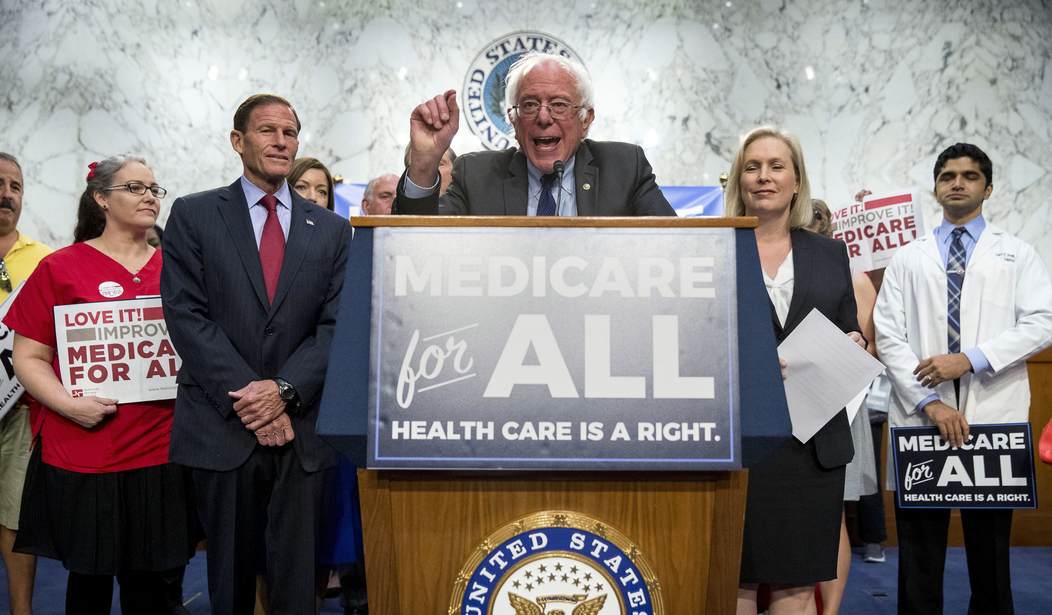Senator Bernie Sanders introduced his new single payer bill Wednesday with support from many of the Democrats expected to run for president in 2020. No one involved thinks the bill is going anywhere anytime soon, the goal is to rally the far left of the Democratic party around an ambitious new goal.
One of the minor little problems that Sanders bill does not address is how to pay for the absolutely massive cost of giving free health coverage to every person in the country. The Washington Examiner’s Philip Klein calls the plan a “joke.”
The Sanders bill would add hundreds of millions of people into an already financially-strapped program while making it more generous — within four years. At no point in the legislation does he describe how he would expect to pay for this ambitious idea or deal with massive disruption it would mean for businesses, workers, and those trying to access care…
It’s worth starting with a reminder of the current finances of Medicare, the program that Sanders wants to use as the vehicle for his vision of socialized medicine. According to the program’s trustees in their most recent report, Medicare, which is expected to cost $700 billion this year, “faces a substantial financial shortfall that will need to be addressed with further legislation.” Its hospital program barely has enough dedicated revenue to break even, and within five years, it’s expected to be running deficits. Within 12 years, the program benefits will have to be slashed because there won’t be any money left in its trust fund.
Klein points out that the new bill doesn’t include any sort of cost estimate but during the campaign last year the Urban Institute put out an estimate of the cost of Sanders’ plan. The bottom line: Federal spending would go up $32 trillion dollars over the first ten years.
Over at New York Magazine, Jonathan Chait points to another glaring problem with Sanders’ plan. Passing it would pull health insurance that most Americans currently have away from them, plans that people say they like. As Chait points out, Sanders isn’t even willing to even discuss how he would overcome this hurdle:
There is nothing in Sanders’s rhetoric that indicates he even recognizes the shape of the political problem. Instead he employs the classic populist technique of imagining the people as a whole standing united around an obvious solution, and only the machinations of an invidious elite can thwart them…
Evil corporations are the only impediment he acknowledges. At no point does he grant that the most important source of opposition will come from actual American voters concerned about losing their current plan or paying higher taxes.
Chait is correct that the ultimate problem with Sanders’ plan is that most people will be firmly against it once they see the cost and the disruption that comes with it. Obamacare faced some of the same problems but 1) it only impacted a portion of the market and 2) President Obama and Democrats were able to successfully lie about the disruption it would cause. Neither of these factors will be in place for Sanders’ plan which would impact everyone and cause massive disruption of the current system. Simply put, no one would be under the illusion they could keep their plan whether they like it or not.
In fact, Sanders’ single payer plan is so far out, it could wind up being an albatross around the necks of Democrats in upcoming elections From Politico Magazine:
Democrats are committing themselves to years more of a treacherous health care debate, at a time when there are more pressing issues to confront. They are emulating Donald Trump’s penchant for quick-fix, bumper-sticker solutions that prove to be, in his own words, more “complicated” once in power. And instead of maintaining a candid relationship with its ideological base in order to temper expectations, the party establishment is indulging it, risking bitter disappointment in the future…
As any single-payer devotee will eagerly tell you, a July Quinnipiac poll found 51 percent of voters support such a system. When characterized as Medicare for All, a June Kaiser Health Tracking poll registered support at 57 percent…
Upon hearing the startling news that single-payer might “give the government too much control over health care,” support plummets to 40 percent. The revelation that the plan would “require many Americans to pay more in taxes” did the same. Maybe, just maybe, a Republican will give these talking points a try.
All Republicans have to do is tell the truth about what this would do, i.e. everyone loses the insurance they have and taxes go up dramatically. This is a losing issue now and will remain a losing issue for the near future. That sort of thing doesn’t seem to matter to Sanders but it will to whichever Democrat is running for the White House in 2020.








Join the conversation as a VIP Member